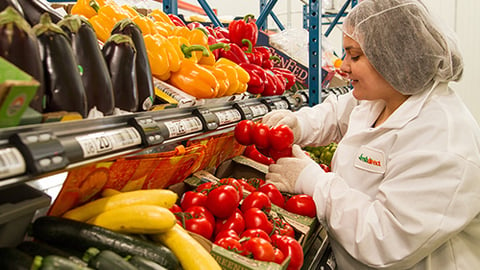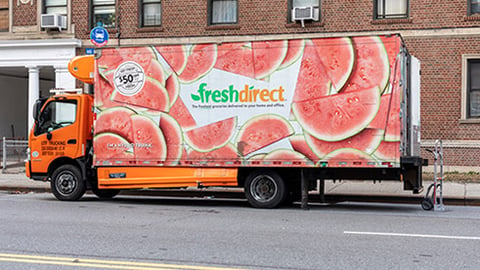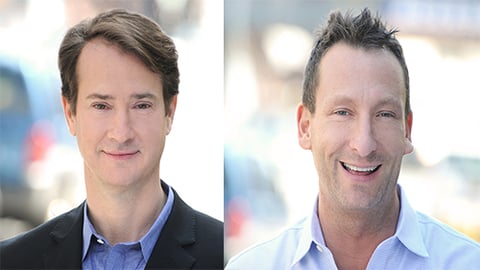FreshDirect Driving Grocery Ecommerce Growth
Progressive Grocer was invited to FreshDirect’s Bronx, N.Y., campus – where it moved from its former Long Island City, N.Y., digs last July – to check out the pure-play e-grocer’s new home.
After a whirlwind tour of the extensive state-of-the-art facility, conducted by COO Tim Knoll and Chief Merchandising Officer Scott Crawford – Progressive Grocer’s Bridget Goldschmidt sat down with CEO David McInerney and Chief Growth Officer P.J. Oleksak to learn more about the company’s current plans and future direction, in part 1 of our interview with the executives ...
Progressive Grocer: Your move to the Bronx campus was a very big milestone in the company and was covered extensively in the press. We covered it, too. What exactly has the move to the Bronx campus meant for FreshDirect?
David McInerney: If you think about it, as FreshDirect, we’ve had 16-plus years of trial and error and learnings. And this, in essence, is the culmination of those 16-plus years of learnings, where efficiency is a piece, but most importantly, what we built and what we strive to do is really just get the highest-quality food directly to [shoppers], when you think about the 30-something different temperature zones, and, frankly, space and the efficiency of moving product through [the] building, and minimal touching [of fresh product].
[We also have] more space in areas like the fish-cutting room. We have the space to bring it into a specific room just to cut it. Cutting it to order, directly into the customer’s bag. At the highest level, it’s taking all of the learnings that we had over the years and redesigning them in this facility.
This facility is sort of the culmination of that. It is, I’d say, 98 percent right. There’s still some tweaking that we’ll have to do, but ... bags, right? Boxes were a big issue for us in Long Island City. We had hardwired our old headquarters to use boxes. Eighteen years ago, that made sense. We had to evolve it into the bags. We’re shipping them in heavy, hard-sided totes so the product gets protected, too.
P.J. Oleksak: I think about what this building has afforded us in three different ways. So, the food and the quality. We were already so strong with our high-quality food, but this helps us take it to the next level with [multiple] temperature zones and things like that.
Also, a lot of R&D in our kitchens. We have significantly more space to build out all of that great food product, which we know is super-important to our customer base. And just expanding the assortment overall – there’s more space, so that we can do that. From a service side, it’s enabled us to really change the game in how we service our customers. Not only even better quality and execution, but doing things like launching same-day [delivery] with FreshDirect.
That was always a part of the design and the plan when we launched [curated food delivery service] FoodKick a few years back. We knew that time was continuing to compress, and consumers’ expectations were evolving. Just how they live their life is different. One of the very cool things that this infrastructure affords us is this idea of continuing to compress that timeframe with which a customer can place an order, and then receive it from us in an efficient manner, which is super-important.
Continuously evolving that service and enhancing it for our customers is a big piece of what we now can do here. And last is just simply expansion. It’s a high-class problem, but a real problem, nonetheless: We had outgrown our space, so we can grow now, which we’re really excited about.
Progressive Grocer: So, in the time that FreshDirect has been in business, how would you say that the whole e-grocery proposition has evolved?
DM: The obvious is the acceptance from 15 years ago to today. The acceptance is there, the evolution to today, and where we see the evolution over the next few years is even more significant.
Let’s first talk about the comfort level, right? Are people comfortable ordering food online? The acceptance is there for that, but the expectation now is very high, as a consumer. [As they’re] switching from bricks and mortar to online, the level of expectation in the quality of the food that they’ll be receiving is even higher.
And the level of trust that they’re putting into us is even higher to actually execute on that. Years ago, it was acceptable to say, “Place an order today, and we’ll deliver it to you tomorrow morning.” That's now evolving to, “No, I want to place the order this morning and get it this evening.” That time compression will continue even more, when you think about customized shopping experiences where we should know who you are and understand what it is that you’re looking for is higher.
I think a big part of this is on the communication piece as well, and the remediation side of things. When you have a problem with an order, it was once acceptable to give a credit for the item. We’ve evolved our thinking to say, “No, if you have a problem, it’s something we’re going to replace for you as quick as humanly possible.”
PJO: Consumers’ lifestyles, and their relationship with food and what they’re interested in, are changing. When you think about the Millennial – we call it Millennial mindset because it extends beyond even an age. People are much more comfortable buying almost anything online.
There’s also the fact [that] people care more about the quality of the food they’re eating. They care more about the food than even potentially a luxury brand, nowadays. Having a really great high-quality product, and the acceptance, and getting more comfortable shopping online, it’s just a very big macro trend that we think is going to open up that market to just a much larger set of consumers, which we think is exciting because we also want to help them have great access to high-quality food.
Progressive Grocer: As a pure-play ecommerce operation, how are you competing against all of these supermarkets who now have jumped into ecommerce? In many cases, they’ve been in their communities for years and years, and shoppers are familiar with them. So how does FreshDirect, as a pure-play operator, compete with that?
DM: The first point is, it’s an enormous market. There’s a lot of room for people to play [in] it. Secondly, our thoughts of differentiation, and our competitive advantage, were always around the quality.
We’ve recently expanded our thinking past just quality. Quality is sort of the table stakes. And how do you enhance the experience even more? And we think about it through the promises that we make to customers. Some are obvious to the consumer, and some are not. But we have to have the right food available for sale. The food that you’re looking for, we have to give you good accessibility, meaning we have to be able to get it to you when you want it. We have to deliver it on time, and you have to be able to count on us that it will consistently be there when we say it will.
And probably the most important piece is, when you receive that bag of food, everything is there. The quality of everything is good, everything’s in great condition, and there’s a couple items – and it won’t be everything – but there are a few items within that bag that are really going to knock your socks off. Now, it could be a piece of harpooned swordfish. It could be some Icelandic cod that we flew in that morning. It could be some really great blueberries. It could be some great local apples. But there has to be a couple items in every person’s bag, where they eat them and they say, “I love FreshDirect. I have to keep coming to them for this.”
And then finally, when we do fall down, we really, really make it right. And as I said, a credit simply just isn’t enough. We have to make it easy for people to connect with us, and we’re doing things like … autocredits where we allow people to, in essence, credit themselves if they have a problem. And real-time remediation and access to people that can help them fix the problem right away. We believe if you do all of those [things] consistently, the only competition that we really need to worry about is ourselves.
Progressive Grocer: So do you feel that being a pure-play operator gives you more agility then?
DM: I don’t think we would ever knock anybody who’s an omnichannel [business]. I do think that we have a lot of years of experience learning, which I think has given us an advantage, [as has] our staying true to the core of just really focusing on those basic promises.
Progressive Grocer: How does FreshDirect decide where it’s going to go next? What goes into when you decide to go into a new market, and do you have any plans that you can actually disclose about future expansion plans?
PJO: We are really methodical. We know who our target customer is, and we are constantly looking at where is there opportunity. There’s still massive opportunity in our existing [Northeast] footprint, and especially with the trends of online grocery, and we’re going to push harder now that we’re settled into our new home.
We’re good at knowing where’s our target demographic and which geo should we really be going after. We are so excited to be expanding into the [D.C., Maryland, Virginia] area. When we launched [in] Washington, D.C., we did a very small foothold because we were running up against the planning of this building. So we’re expanding there, which we’ve already released. Boston is absolutely a city that we are focused on, and we are actively working towards that expansion, and we hope to be there within the next year.
And when I think about FoodKick, there will be multiple geos that we’re entering for sure. We’ll be entering New Jersey over the next year. So we’re excited about that as well. When we think about the Northeastern Seaboard, there’s still just so much opportunity. And one of the things that I think is really important to say is the suburbs are really great for this business, too. We do very well in both suburbs and urban environments, which I think is probably something that people didn’t expect from online grocery. It’s been a great success for us.
Progressive Grocer: What do you think is the reason for that particular success in the suburbs?
PJO: I think it’s a combination of two things. One, I think there’s a different competitive landscape. But then also, just bigger families and their need for that convenience in their lifestyle, as well as the opportunity to really win in fresh. Because I think there’s even a broader differentiation [of] our high-quality product.
DM: There’s a high level of appreciation from consumers within the suburbs, particularly around the fresh side, because … there may be less access to very, very high-quality food in all of the suburbs. And us being able to provide that affords almost a new luxury to folks there.
Progressive Grocer: Do you envision the company as an exclusively East Coast thing, or would you ever consider expanding beyond the Eastern Seaboard?
DM: Again, the new Fresh Direct headquarters is really the structural base that is now complete. Our relatively short-term goals are to make a strong move along the Northeast Corridor. Once that’s complete, there are multiple other target areas that we see as very attractive where we would be building out additional facilities.
PJO: This is definitely a concept that lives beyond the Northeast.
Note: Interview has been condensed and edited for clarity. In part 2, McInerney and Oleksak discuss delivery challenges, food sourcing and what their future vision of ecommerce is.






